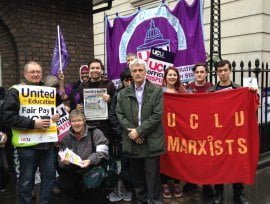At a General Assembly of the University College London student union (UCLU) late last year, almost 600 students attended to discuss a move by certain societies to merge sabbatical officers’ positions for the sake of making more funds available elsewhere. Nina Christou of the UCLU Marxists looks at the issues involved in this important debate.
The last General Assembly that was called by UCLU before the Christmas break was attended by almost 600 students, one of the biggest attendances for years for such an event. The biggest question concerning those participating was the merging of some sabbatical officers’ positions, such as the women’s officer and the LBGT+ officer.
The atmosphere was intense and emotional for most students; many were angry and there was a clear difference between the two positions: one side supporting that some sabbatical officers must be made redundant, the other side supporting that this would be undemocratic and unrepresentative of UCLU’s philosophy as a student body.
Why cut at all?
However the main question, the root of the problem, wasn’t properly addressed: why does the UCLU need to make cuts? What has caused the financial problems that the student union is facing?
The answer to this question is that the student union, like UCL itself, is getting hit by the global crisis of capitalism that has affected the economy of the UK. The result has been cuts to higher education budgets, the privatisation of university buildings, and the hiking of rents – both for individuals and institutions based in London.
Should the student union have to pay for this crisis by sacrificing its democratic structure? Unless we actively and consciously fight against the capitalist system, which is in its death throes trying to drag everyday people and students into misery, the hole in the budget will be filled through austerity-like measures.
Unite to defend the women’s officer position!
It is also important to consider why is it that positions such as the women’s officer are being singled out. There were some hateful comments made against the women’s officer during the General Assembly, many students objecting the reason for this position’s existence.
We, as Marxists, are in full support of such a position in the student body since, as mentioned in the meeting, the question of gender inequality is still very much present in our society and incidents of women’s oppression should be taken seriously by UCLU.
However, we are completely opposed to the idea that only women can vote the for women’s officer, excluding and alienating men from such important issues. Many men want to – and do – fight against women’s oppression. Not letting them vote means that their opinion is not taken into account. By making it a problem that only women have to deal with, it encourages the prejudice that it is only women that have to put thought and time into the question of inequality on campus.
Most men care about what women around them are faced with, and forcing them to not have a political stance on the matter is completely counter-productive. The UCLU is basically saying to men “Let women do their thing; it’s none of your business”. Therefore, we find this tactic paradoxically sexist.” There are student bodies in other universities (such as London Metropolitan University) where all students, men and women, can vote on the women’s officer.
Students and workers – unite and fight!
It’s no accident that these kind of problems arise now, during one of the deepest crises of capitalism. The UCLU needs to deal with the most pressing problems that the students are faced with: high rents; tuitions fees; lifelong commitment to pay back student debts; increases in food and drink prices; no spaces in the library due to the selling-off of UCL buildings, etc.
The student union officers are, at best trying to address these question without much noticeable effect. At worst, they are ignoring these important questions altogether.
If the UCLU doesn’t fight back we should be expecting many more General Assemblies where nothing is resolved. If the UCLU doesn’t make itself relevant and represent its students, many more proposals might appear that seek to abolish its democratic representatives.
The student union could be a very influential body, expressing the opinions of almost 30,000 students living in London. They could achieve a great deal by mobilising students, linking up with workers, and fighting once and for all against the system that is responsible for the collapse of university services and for forcing students to live a life of stress and misery. This is the task that the student union leaders – in UCLU and nationally in the NUS – must set themselves.






